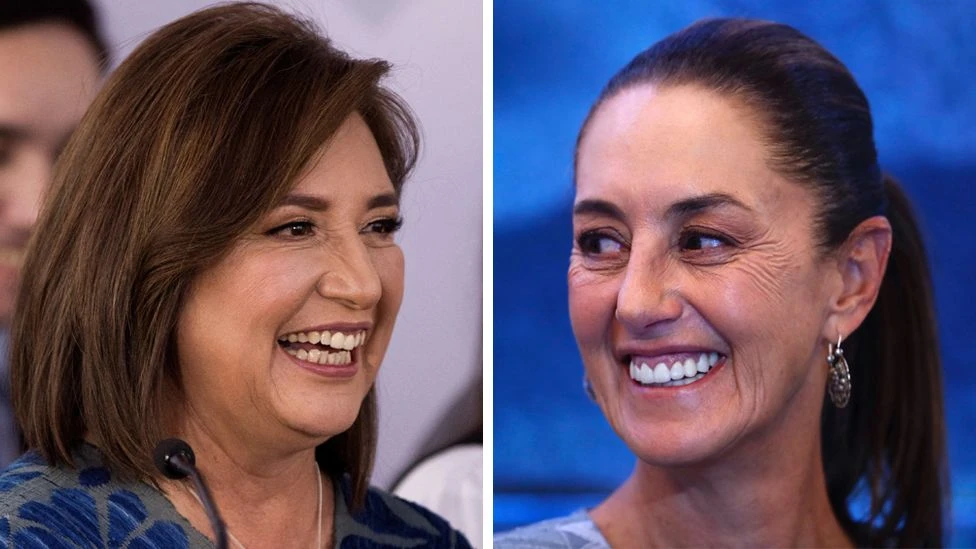Women lead race as Mexicans vote for new president

Stay tuned with 24 News HD Android App

Mexicans voted Sunday in a presidential election dominated by two women -- a historic first in a country with a history of gender-based violence and discrimination.
Thousands of troops were expected to be deployed to protect voters, following a particularly bloody electoral process that has seen more than two dozen aspiring local politicians murdered.
Ruling party candidate Claudia Sheinbaum, a former Mexico City mayor and a scientist by training, had a 17 percentage point lead over her main opposition rival Xochitl Galvez on the eve of the vote.
The only man running, centrist Jorge Alvarez Maynez, was trailing far behind.
It means that, barring a huge surprise, a woman is almost certain to break the highest political glass ceiling in Mexico, where around 10 women or girls are murdered every day.
"A female president will be a transformation for this country, and we hope that she does more for women," said Clemencia Hernandez, a 55-year-old cleaner in Mexico City.
"Many women are subjugated by their partners. They're not allowed to leave home to work," she said.
Mariana Nieves, a 28-year-old designer, said a lot of younger Mexicans were fed up with politicians.
"But we have to vote because we're hopeful of something good for Mexico in security, education. I'm happy that a woman is going to win but I'm not very excited because I think neither of them has coherent proposals" on improving women's rights, she said.
Nearly 100 million people were registered to vote in the world's most populous Spanish-speaking country, home to 129 million people.
Sheinbaum, 61, owes much of her popularity to outgoing President Andres Manuel Lopez Obrador, a fellow leftist and mentor who has an approval rating of more than 60 percent but is only allowed to serve one term.
Blood-soaked campaign
In a nation where politics, crime and corruption are closely entangled, ultra-violent drug cartels have gone to extreme lengths to ensure that their preferred candidates win.
Hours before polls opened, a local candidate was murdered in a violent western state, authorities said, joining at least 25 other political hopefuls killed this election season, according to official figures.
Israel Delgado, 35, was shot on Saturday night near his home, the Michoacan state prosecutor's office said.
In another sign of the difficulties of staging elections in cartel hotspots, voting was suspended in two southern municipalities because of violence, local authorities said Saturday.
"The fight against organized crime will be the biggest challenge for the next president," said Guadalupe Correa-Cabrera, a professor at George Mason University, in the United States.
Security was the weakest point of Lopez Obrador's administration, she told AFP.
Sheinbaum has pledged to continue the outgoing president's controversial "hugs not bullets" strategy of tackling crime at its roots.
Galvez has vowed a tougher approach to cartel-related violence, declaring "hugs for criminals are over."
More than 450,000 people have been murdered and tens of thousands have gone missing since the government deployed the army to fight drug trafficking in 2006.
The next president will also have to manage delicate relations with the neighboring United States, in particular the vexed issues of cross-border drug smuggling and migration.
'Not alone'
Addressing a cheering crowd of thousands at her closing campaign rally, Sheinbaum said Mexico was going to "make history" this weekend.
"I say to the young women, to all the women of Mexico -- colleagues, friends, sisters, daughters, mothers and grandmothers -- you are not alone," she said.
The ruling party candidate had the backing of 53 percent of voters as campaigning drew to a close, according to a poll average compiled by research firm Oraculus.
Galvez, an outspoken senator and businesswoman with Indigenous roots, was second with 36 percent. Maynez, 38, had just 11 percent.
Galvez, 61, often evokes her childhood story of growing up in a poor, rural town in central Mexico where she says she sold candy to help her family.
"While you danced ballet at the age of 10, I had to work," she told Sheinbaum, a former student activist who was born in the capital to a family of Jewish immigrants.
While millions of Mexicans have escaped poverty in recent years, more than a third still live below the poverty line in Latin America's second-biggest economy.
As well as voting for a new president, Mexicans will choose members of Congress, several state governors and myriad local officials.
In total, more than 20,000 positions are being contested.
